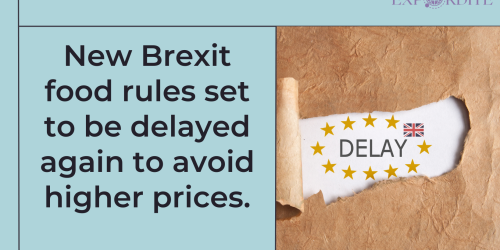10 UK Export News You Might’ve Missed – Week 21

(Also published on LinkedIn)
In this edition of Export News from Expordite, we’ll cover the top 10 UK export news and headlines from week 21 of 2023 – May 22-28, 2023.
But first, we’d like to show you our overview of the benefits of the new UK trade deal with New Zealand. You can watch it below:
Now for the export news of last week:
General Export News
1. UK and Czechia strengthen defence export prospects
“Czechia is about to complete negotiations to sign a contract with UK-based defence company, SUPACAT, for 24 High Mobility Transport (HMT) vehicles for their Armed Forces, known in the British Army as the JACKAL series of reconnaissance and long range patrol vehicles. The UK has been producing these vehicles for more than ten years, with contracts delivering on the Prime Minister’s priorities to grow the economy and support UK jobs.”
Source: GOV.uk
2. Kemi Badenoch visits Gulf to boost trade ties
“Business and Trade Secretary Kemi Badenoch will hold talks to encourage the Gulf Cooperation Council (GCC) Ministers to advance the UK’s ambitions for a modern, comprehensive trade deal as she visits Qatar, Saudi Arabia and the United Arab Emirates this week.
The UK began negotiations with the six-country bloc in 2022 and has completed three rounds of talks so far.
Collectively, the GCC is equivalent to the UK’s seventh largest export market. Their demand for goods and services is expected to grow rapidly to almost £1 trillion by 2035 – an increase of over 75%.
This will open huge, new opportunities for UK businesses, from food and drink to cars and clothes – removing these types of tariffs as part of a trade deal will help to increase choice for GCC consumers, giving them access to a greater range of UK products. This will help to create jobs across the country, support businesses to expand and grow the economy.”
Source: GOV.uk
3. Cambodia & UK sign MoU to strengthen trade relations
“In a bid to bolster trade cooperation, the ministry of commerce of Cambodia and the UK’s ministry of business and trade have formalised a Joint Trade and Investment Forum (JTIF) through a memorandum of understanding (MoU). The newly established forum, backed by the MoU, aims to fortify the trade and investment ties between the UK and Cambodia, offering a platform to shape and advance these relationships.
Minister Sorasak hailed the JTIF as a positive step towards strengthening the trade cooperation between the two nations, with the ambition to enhance the investment and business landscape and advocate for economic diversification.”
Source: Fibre2Fashion
4. Government warns additional due diligence is needed to avoid sanctions being avoided
“The government’s Export Control Joint Unit (ECJU) has published fresh guidance warning traders that additional due diligence is needed to prevent sanctions being evaded in their supply chains.
While it represents a slight step back from a mooted total-ban on exports to Russia, the list of sanctioned goods is set to expand significantly and will include industrial equipment, diamonds and metals.
In addition, governments around the world are reportedly cracking down on sanctions-busting tactics that have seen goods exported to third-party nations before being re-exported to Russia.”
Source: The Institute of Export & International Trade
Food Export News
5. Rishi Sunak column: Ensuring British farming is at the heart of British trade
“Last week, when I hosted the first-ever Farm to Fork Summit in Downing Street, I thanked farmers on behalf of the whole nation for everything they do. I also set out my ambition to change the way we support farming in this country, including by ensuring British farming is at the heart of British trade.
<…>
We will work with the Food and Drink Export Council to capitalise fully on the ever-growing global demand for UK products. We will invest an additional £2m to strengthen our presence at major trade shows. We will increase the number of UK agriculture attachés to help us reach new markets, in addition to the over 100 staff we already have supporting Great British agriculture, food and drink to export overseas. We will also create a £1m programme to support our dairy sector to export.”
Source: Yahoo!News
6. Agrifood exporter says UK FTA creates fresh opportunities
“Manildra Group started off as a flour mill in rural New South Wales in 1952. Today the Australian family-owned company is one of Australia’s premier agribusiness exporters, with products ranging from starch-based food to animal products.
The new Australia-UK Free Trade Agreement (A-UKFTA) creates fresh opportunities for Manildra.
While the UK was part of the EU, the company was largely restricted from selling into British markets. This was due to high tariffs on food imports from Australia, plus quotas.
From 31 May, the new FTA eliminates tariffs on over 99% of Australian exports into the UK. Remaining tariffs – including on some food items – will be progressively reduced.”
Source: Australian Trade & Investment Commission
7. UK government drops bill to end live animal exports
“Rishi Sunak’s government has ditched a bill that would effectively have banned the export of live farmed animals for fattening and slaughter.
In a statement to the House of Commons on Thursday 25 May, Defra farming minister Mark Spencer confirmed the government was dropping the Kept Animals Bill.
Mr Spencer told MPs that while animal welfare “has been a key priority of the government”, the legislation “risked being extended far beyond the original commitments in the manifesto”.
Source: Farmers Weekly
Vehicle Export News
8. UK car production up in April as exports surge
“British car manufacturing made further gains in April, with output increasing for the third month in a row, up 9.9%, according to the latest figures published today by the Society of Motor Manufacturers and Traders (SMMT). 66,527 cars rolled out of factory gates, 5,973 more than in April last year as global supply chain shortages, most notably of semiconductors, continued to ease.
Exports drove volumes, rising 14.7% to 54,820 units, with more than eight in 10 cars (82.4%) heading overseas. This was the third month in a row that exports saw a double-digit rise. The European Union remained by far the most important global market, taking 58.4% of all exports, equivalent to 32,002 units with volumes up 12.2%, followed by the US, China and Australia. Shipments to these destinations changed by 36.2%, -3.6% and 226.8% respectively, with buyers choosing the latest British-built models, including many with hybrid or zero emission powertrain technology.”
Source: SMMT
9. Jaguar Land Rover owner Tata looks set to pick Somerset over Spain for car battery gigafactory
“Hopes for the UK’s electric vehicle industry have been reignited as Jaguar Land Rover’s owner looks set to pick Somerset over Spain for a car battery plant.
Deals with Tata and Tesla would significantly bolster Britain’s electric vehicle (EV) sector, which has had a rocky ride in recent months – from the collapse of Britishvolt to the crisis surrounding the lack of electric chargers.
There are also ongoing concerns over ‘rules of origin’ laws which could see tariffs of 10pc whacked on EVs exported to the EU that do not meet strict criteria.
Under current plans, 45 per cent of an electric car must be sourced in the UK or elsewhere in Europe to avoid export tariffs of 10 per cent.”
Source: This Is Money
10. UK warned it has left it ‘too late’ on Brexit electric vehicle battery rules
“The UK has left it “too late” to develop its electric vehicle battery production in time to meet a European Union trade deadline, a leading motor industry figure has told MPs.
The warnings, made to the Business and Trade Select Committee, came as the Trade Secretary, Kemi Badenoch, said that the UK and the EU will “soon” announce a solution to an impending car tariff deadline.
From next year, 45 per cent of an electric vehicle’s value must be sourced in the UK or Europe to avoid export tariffs of 10 per cent. A lack of local battery production means UK carmakers will have to rely on Chinese, Japanese and South Korean manufacturers.”
Source: iNews
Want to get more international trade content straight to your inbox?






